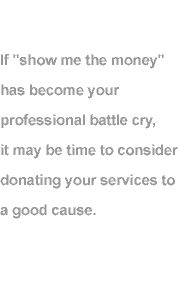|
By Stephanie Booth


 Rosenbaum became friendly with other volunteers who were also self-employed. Like her, they were eager to balance the solitary existence of self-employment with a direct connection to the community.
Rosenbaum became friendly with other volunteers who were also self-employed. Like her, they were eager to balance the solitary existence of self-employment with a direct connection to the community.

|
|
Unless you're Bill Gates, chances are you don't have the cash to fund endowments over lunch or the power to pick up a phone and save a few acres of rainforest. Fortunately, though, having a billionaire's bank account isn't a requirement for giving back to the community. Donating your time and expertise to a worthwhile cause may not only recharge your karma, but it can boost your business and encourage an affinity with other IPs as well.
Meeting Other IPs
Susan Rosenbaum was already a volunteer when she officially turned IP last May and formed her New York City-based business strategy consulting firm, Success @ Work. For over a year now, Rosenbaum has been putting her culinary arts degree to work at God's Love We Deliver, a non-profit organization which delivers hot meals to AIDS patients. Three hours each week, she packs salads and chops vegetables for the next day's meals. "I don't see the people who eat the food I prepare, but I do feel like I'm helping those who are truly in need," says Rosenbaum. "Everything I touch goes to a good cause."
While keeping her chopping and dicing skills fresh, Rosenbaum became friendly with other God's Love's volunteers who were also self-employed. Like her, they were eager to balance the sometimes solitary existence of self-employment with a direct connection to the community. And they urged Rosenbaum to contact the Business Volunteers of the Arts (BVA), a non-profit program that matches skilled professionals with non-profit arts organizations looking to strengthen their business practices.
"A lot of non-profit organizations are really scrambling to find funds and make their patrons happy," Rosenbaum explains. "When I walked into the Lower East Side Tenement Museum [where she was placed by the BVA], I thought, 'This is the greatest museum ever and no one knows about it.' I was really eager to do what I could to change that."
When she began at the museum in July, Rosenbaum used her background in store operations at Bloomingdale's and Macy's to revitalize the museum's gift shop. Now she's moved on to tackle their membership numbers. "Every piece of information I can offer means so much to them," she explains. "It's really a joy to provide the help that they need."
Gaining Visibility
Bruce Halstead, an accountant in Maplewood, N.J., only recently took the plunge from working at a large financial institution in Manhattan to having his own full-time private practice, but for the past two years, volunteering has been part of his professional routine.
One day, coming home from work on the train, Halstead struck up a conversation with another commuter. They got off at the same stop and exchanged cards. Not only did Halstead recognize the man's company and name, but realized they'd spoken on the phone a number of times in recent months. The man suggested Halstead consider joining the neighborhood's economic business council; after a string of coincidences like that, Halstead felt he couldn't refuse.
His experiences serving on the Economic Development Council of Maplewood were so positive that Halstead now volunteers for more groups. He sits on the board for the Newark Community School for the Arts and performs local pro-bono tax returns for the elderly and poor through the National Association of Black Accountants (NABA), of which he is treasurer.
|
 "It's cool to know what's up with my neighborhood; you could say it gives me an extra edge. And the visibility and knowing what's going on in my field has springboarded my practice. I've gotten to know more people -- and gained a few more clients -- because of everything I've been involved in."
"It's cool to know what's up with my neighborhood; you could say it gives me an extra edge. And the visibility and knowing what's going on in my field has springboarded my practice. I've gotten to know more people -- and gained a few more clients -- because of everything I've been involved in."
 |
|
"I don't know how I do it," Halstead laughs. "I feel like I'm doing too much, but each experience has been very positive. It's cool to know what's up with my neighborhood; you could say it gives me an extra edge. And the visibility and knowing what's going on in my field has springboarded my practice. I've gotten to know more people -- and gained a few more clients -- because of everything I've been involved in."
Halstead has also learned how to bow out gracefully when the demands become too great. After sitting on the board of another local organization for a year, he reevaluated the time he was spending on it and what he was getting back. "Basically, there were really no benefits to me, and our interests were very different," he explains. "Still, I left it so I could come back at anytime. I just said that my inability to give 100 percent was unfair to the organization, and they understood."
Finding the right non-profit organization can be a challenge in itself. How do you know that you'll click with the interests of the organization? How will you know what professional skills they'll appreciate? Will they expect you to be at their beck and call -- at the expense of your paying clients?
Enjoying the Change of Pace
Dan Kaslow, president of his own New Jersey marketing/consulting firm, MarketFocus, sought out the BVA's help when he decided to volunteer for the first time in twenty years. A strong supporter of the arts, Kaslow decided to put his time into a cause he knew he was genuinely enthusiastic about. His skills in strategic market planning, market research, product development, and financial management were quickly put to good use. Since last fall, he's been creating a cohesive market plan for a crafts organization.
"It's very different from the business-to-business work I typically do for my clients," Kaslow notes. "Here, you really feel like 'We're all in this together.'"
Being an IP usually means having a more flexible schedule than 9-to-5-ers, which can be a definite advantage in this type of volunteering. Kaslow, for instance, is able to commute an hour into Manhattan every other week. He meets with the executive director overseeing his project, then, when time permits, puts in another day's work at his home office.
|
 "Non-profits have such different parameters than paying clients. They don't look at everything to see how much money they'll be able to make. It's a change to the normal routine."
"Non-profits have such different parameters than paying clients. They don't look at everything to see how much money they'll be able to make. It's a change to the normal routine." |
|
"If this were a paying client, I'd be working on it all day every day. It'd have to get done a lot faster," Kaslow explains. "But here we do a little bit at a time. Non-profits have such different parameters than paying clients. Their purpose for being is not to generate profit, and they don't look at everything to see how much money they'll be able to make. It's a change to the normal routine."
Kaslow says advancing his business is not necessarily at the forefront of his mind when he's volunteering for the crafts organization, although there are certainly fringe benefits. "I just really enjoy what I do," he says. "I've established connections with people who aren't in my field. I've gotten to be close to the action in this organization. And I've gained an appreciation of American crafts," he points out. "I'm hoping they'll throw in some free tickets to their craft show in Baltimore."
|
|
July 10, 2000
Primary Editor: Katy Demcak
Illustrator: Lawrence San
Production: Fletcher Moore
|
|
We'd love to hear your comments about this article!
Stephanie Booth is a freelance writer who lives in Princeton, New Jersey. If you like, we'd be happy to put you in touch with her, or with any of the other IPs named in this article.
|



